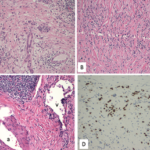Considerations & Implications
The trial was the culmination of 15 years of work after Dr. Stone first used a B cell-depleting agent and was “astonished by the perceived efficacy of B cell depletion” in four IgG4-RD patients.
The results of the current trial—conducted at 80 sites in 22 countries—confirm the efficacy of B cell depletion. “The overwhelming efficacy of B cell depletion underscore the reason that it’s important to identify the disease, because IgG4-RD participants with it respond so well to (inebilizumab) therapy,” Dr. Stone says.
First recognized as a unique condition in 2003, IgG4-RD has thus far been considered a rare disease. However, it is difficult to differentiate IgG4-RD from conditions that rheumatologists see often, such as anti-neutrophil cytoplasmic autoantibody (ANCA) associated vasculitis, Sjögren’s disease, systemic lupus erythematosus, sarcoidosis and aortitis, Dr. Stone points out.
“Rheumatologists are highly likely to see many patients with this disease over the course of their careers, because this is not a vanishingly rare condition at all,” he maintains. “The epidemiology so far suggests that IgG4-related disease may be as common as, or even more common than, some of those. If rheumatologists feel like they’re not seeing it in their practice, my strong suspicion is that they’re missing the diagnosis and may be considering it to be something else.”
Unlike most autoimmune diseases, IgG4-RD affects more men than women. An additional consideration for managing the disease is that often affects the sexes differently. Other recent research by Dr. Stone shows that 50% of men are affected in the pancreas vs. only 26% of women. Renal involvement affects 39% of men vs. 18% of women. The disease is likely to be more severe in men.2
Inebilizumab is currently marketed by Amgen as UPLIZNA for treatment of a rare autoimmune disease of the central nervous system, neuromyelitis optica spectrum disorder.
Dr. Stone is hopeful that the overwhelmingly positive results from his phase 3 trial will lead to U.S. Food & Drug Administration (FDA) approval of inebilizumab to treat IgG4-RD, and then approval by regulatory agencies in other countries. The FDA is currently reviewing a submission for inebilizumab to treat IgG4-RD.
Deborah Levenson is a writer and editor based in College Park, Md.
References
- Stone JH, Khosroshahi A, Zhang W, et al. for the MITIGATE Trial Investigators. Inebilizumab for treatment of IgG4-related disease. N Engl J Med. 2024 Nov 14. Online ahead of print.
- Jha I, McMahon GA, Perugino CA, et al. Sex as a predictor of clinical phenotype and determinant of immune response in IgG4-related disease: A retrospective study of patients fulfilling the American College of Rheumatology–European League Against Rheumatism classification criteria. Lancet Rheumatol. 2024 Jul;6(7):e460-e468.
Disclosure
Dr. Stone has received consulting fees from Amgen related to IgG4-RD, glucocorticoid toxicity and systemic vasculitis.


